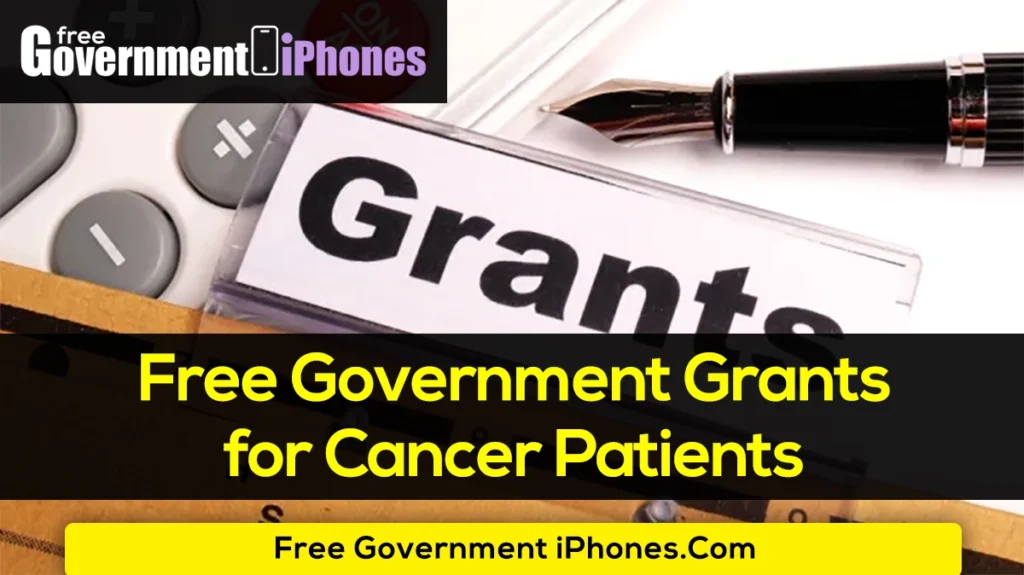In today’s world, receiving a cancer diagnosis can be a life-altering event, touching every aspect of one’s life. It’s not just about the physical and emotional toll; it often comes with a significant financial burden. The costs of medical treatments, medications, and related expenses can pile up rapidly, leaving patients and their families grappling with financial hardship. The good news is that there is a lifeline available in the form of government grants for cancer patients. In this article at Free Government iPhone, we will delve into how these grants work, who is eligible, and how you can apply for them.
Free Government Grants for Cancer Patients
In times of hardship, there are organizations dedicated to helping cancer patients overcome the financial challenges that often accompany their journey. These national service organizations offer support that can make a real difference:
Cancer Financial Assistance Coalition (CFAC)
CFAC is a collective of national organizations committed to providing financial assistance to cancer patients. They offer a searchable database of financial resources, making it easier for patients to find the help they need.
CancerCare
CancerCare steps in with limited financial aid for co-pays, transportation, home care, and child care. They also offer a list of sources for financial assistance and a database of organizations ready to provide financial or practical support.

Family Reach
Family Reach is on a mission to eliminate the financial obstacles that come with a cancer diagnosis, a problem known as Cancer-Related Financial Toxicity (CRFT). They’re dedicated to making sure that financial concerns don’t stand in the way of treatment.
Healthwell Foundation
This non-profit organization assists patients dealing with chronic, life-altering diseases, ensuring they can afford their medications when health insurance falls short. There are also Free Tablet for Disabled available which you can apply and get it.
Leukemia & Lymphoma Society
For those facing blood cancers like leukemia, lymphoma, or multiple myeloma, this society offers limited financial aid to help cover treatment-related costs for patients in significant financial need.
National Foundation for Transplants
If you’re in need of a transplant, including bone marrow or stem cell transplants, this foundation provides fundraising assistance to make these life-saving procedures possible.
Triage Cancer
Their Cancer Finances online tool is a valuable resource for understanding the financial aspects of your cancer journey, whether you’re newly diagnosed or a survivor. Get your grand from Triage Cancer organization today.
The SamFund
The SamFund non-profit organization is dedicated to young low income individual cancer survivors, offering grants, financial education, and resources to help them overcome financial challenges.
These organizations stand ready to support cancer patients in their time of need, ensuring that finances don’t hinder their path to recovery.
What Are Government Grants?
Government grants are essentially financial assistance programs provided by federal, state, and local government agencies. These grants are not loans; they are funds given to individuals, organizations, and businesses to help them with various needs, including medical expenses. This means that recipients do not have to repay the money they receive, making government grants a valuable resource for those facing financial challenges due to cancer.
Types of Government Grants for Cancer Patients Government grants designed to assist cancer patients cover a wide range of needs, including:
1. Medical Treatment: These grants help cover the costs of essential cancer treatments like chemotherapy, radiation therapy, and surgery.
2. Medication Assistance: Financial aid is available for prescription medications, including those used to manage cancer symptoms and side effects.
3. Transportation and Housing: Grants can help patients with travel and accommodation expenses when they need to seek treatment at distant medical facilities.
4. Home Healthcare Services: Some grants support in-home care for cancer patients, including nursing services and necessary medical equipment.
5. Rehabilitation and Therapy: Grants can cover the expenses associated with physical therapy, occupational therapy, and other forms of rehabilitation. There are Free Tablets for Seniors available to apply.
Eligibility Criteria
Government grants for cancer patients are intended to assist those who are facing financial hardship due to their medical condition. The eligibility criteria may vary depending on the specific grant program, but common factors include:
1. Diagnosis Verification: Applicants usually need to provide medical documentation confirming their cancer diagnosis from a licensed healthcare provider.
2. Financial Need: Most grant programs require applicants to demonstrate their financial need, often through income and asset assessments.
3. Citizenship or Residency: Some grants may be restricted to U.S. citizens or residents, while others may be open to individuals with specific visa statuses.
4. Specific Cancer Types: Certain grants may be tailored to patients with particular types of cancer or those at specific stages of the disease.
Applying for Government Grants
If you or a loved one is seeking financial assistance for cancer-related expenses, here are the steps to apply for government grants:
1. Research Grant Programs: Start by researching government grant programs at the federal, state, and local levels that are designed to assist cancer patients. Websites such as Grants.gov and Cancer.gov can be valuable resources.
2. Review Eligibility Criteria: Carefully review the eligibility criteria for each grant program to determine which ones you may qualify for.
3. Gather Required Documents: Collect all necessary documents, including medical records, financial statements, and identification.
4. Complete Applications: Fill out the grant applications accurately and thoroughly, following the instructions provided by the granting agency.
5. Submit Applications: Submit your completed applications by the specified deadlines. Be sure to keep copies of all documents for your records.
6. Follow Up: After submitting your applications, follow up with the granting agencies to ensure they have received your documents and to inquire about the status of your application.
FAQs
1. Are these grants available to all cancer patients?
Grants vary in eligibility criteria, but many are open to cancer patients facing financial hardship. It’s essential to research specific grant programs to find those that match your circumstances.
2. How long does it take to receive grant approval and funds?
The processing time varies by grant program, but it’s advisable to apply as early as possible to expedite the process.
3. Can I apply for multiple grants simultaneously?
Yes, you can apply for multiple grants if you meet the eligibility criteria for each program. However, be sure to follow the guidelines and requirements of each grant application.
4. Do I need a lawyer or consultant to apply for these grants?
While it’s not mandatory, some individuals choose to seek assistance from professionals who specialize in grant applications. It’s a personal choice, and many applicants successfully apply on their own.
5. What if my financial situation changes after receiving a grant?
It’s important to notify the granting agency if your financial situation changes significantly. Failure to do so could affect your eligibility for the grant or result in the need to repay the funds.
Final Thoughts
A cancer diagnosis can be an overwhelming journey, impacting both your health and your finances. However, government grants for cancer patients offer a glimmer of hope, providing much-needed assistance during a challenging time. By understanding the types of grants available, eligibility criteria, and the application process, you can take concrete steps to alleviate some of the financial burdens associated with cancer treatment.





